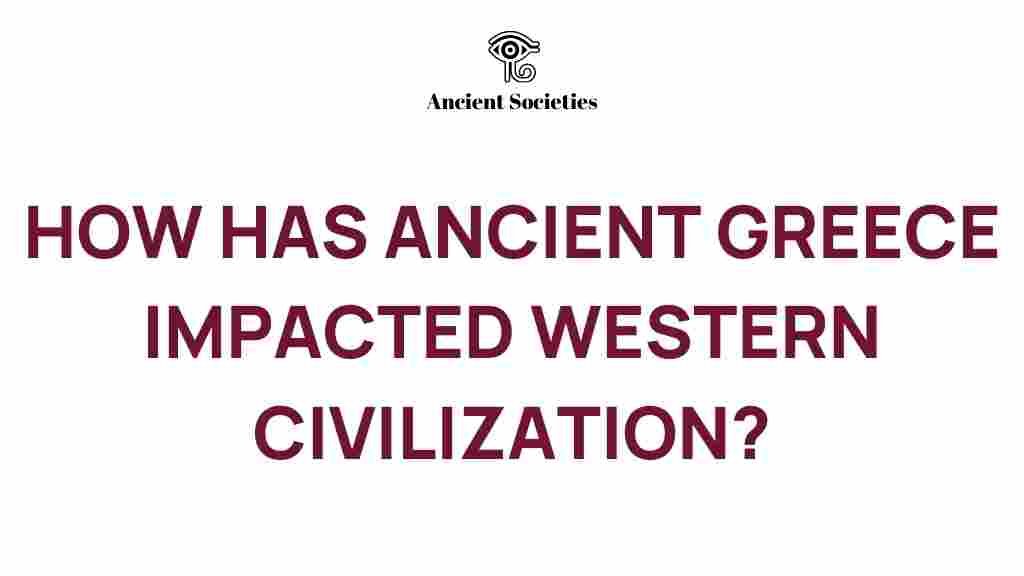Unraveling Ancient Greece: The Foundations of Western Civilization
Ancient Greece is often hailed as the cradle of Western civilization, a place where ideas about philosophy, democracy, art, architecture, and culture flourished. This remarkable era laid the groundwork for many aspects of modern society that we often take for granted. In this article, we will explore how Ancient Greece has influenced various facets of Western civilization, from political systems to artistic expressions.
The Birth of Democracy
One of the most significant contributions of Ancient Greece to Western civilization is the concept of democracy. Originating in Athens around the 5th century BCE, this political system allowed citizens to participate directly in decision-making processes.
- Direct Democracy: Citizens had the right to assemble and vote on laws and policies.
- Political Equality: Every citizen, regardless of wealth, had an equal voice.
- Influence on Modern Governments: The principles of Athenian democracy inspired many modern democratic systems.
The Athenian model of democracy was revolutionary and has greatly influenced political structures across the globe, from the United States to European nations. The ideals of civic participation and representation continue to shape modern governance.
The Philosophical Foundations
Ancient Greece was also the birthplace of Western philosophy. Thinkers such as Socrates, Plato, and Aristotle laid the groundwork for philosophical inquiry that still resonates today.
- Socrates: Known for his method of questioning, he emphasized the importance of ethics and self-examination.
- Plato: His works, such as “The Republic,” explored ideas of justice, governance, and the ideal state.
- Aristotle: A student of Plato, he contributed to numerous fields, including logic, biology, and politics.
These philosophers not only shaped intellectual discourse in their time but also established frameworks for thinking critically about existence, ethics, and governance—elements that are crucial in the study of Western civilization.
Art and Architecture: Aesthetic Innovations
In addition to political and philosophical advancements, Ancient Greece made remarkable contributions to art and architecture that have influenced Western civilization profoundly.
- Sculpture: Greek sculptors such as Phidias emphasized realism, proportion, and the beauty of the human form.
- Architecture: The Parthenon in Athens is a prime example of Doric architecture and symbolizes the achievements of Ancient Greece.
- Theater: Greek drama laid the foundation for Western literature, with playwrights like Aeschylus, Sophocles, and Euripides.
The emphasis on symmetry, proportion, and harmony in Greek art and architecture continues to inspire artists and architects today. The ideals of beauty and balance established by the Greeks remain integral to Western artistic traditions.
Cultural Contributions and Legacy
Ancient Greece’s cultural achievements extend beyond art and philosophy. Its mythology, literature, and communal practices have left an indelible mark on Western civilization.
- Mythology: Greek myths explore themes of heroism, morality, and the human condition, influencing literature and art throughout history.
- Literature: Epic poets like Homer, with works like “The Iliad” and “The Odyssey,” set the standard for narrative storytelling.
- Sports: The Olympic Games originated in Ancient Greece, promoting athletic excellence and unity among city-states.
These cultural elements not only enriched the lives of the ancient Greeks but also provided a foundation for various aspects of Western culture, from literature to sportsmanship.
Religious Influences
The polytheistic beliefs of Ancient Greece also played a significant role in shaping Western civilization. The Greek pantheon of gods and goddesses influenced art, literature, and moral values.
- Deities: Gods like Zeus, Athena, and Apollo personified human traits and natural phenomena.
- Literary Works: Many literary works, including tragedies and comedies, drew on mythological themes and characters.
- Religious Practices: Festivals and rituals, such as the Panathenaea, fostered a sense of community and cultural identity.
The myths and religious practices of Ancient Greece have permeated Western literature and art, providing a rich tapestry of themes and stories that endure to this day.
Challenges and Troubleshooting Tips
While studying Ancient Greece and its impact on Western civilization, one might encounter several challenges:
- Complex Terminology: Ancient texts often contain complex language and concepts. Consider referring to comprehensive glossaries or guides.
- Source Bias: Many historical accounts are written from specific cultural perspectives. Cross-reference multiple sources for a well-rounded understanding.
- Historical Context: Understanding the context of the time is crucial. Utilize timelines and historical analyses to frame your studies correctly.
By addressing these challenges, one can gain a clearer and more nuanced understanding of Ancient Greece’s profound influence on Western civilization.
The Enduring Influence of Ancient Greece
As we explore the myriad ways in which Ancient Greece has shaped Western civilization, it becomes evident that its influence is both vast and enduring. From the principles of democracy to the philosophical inquiries that challenge our thinking, the legacy of Ancient Greece continues to resonate.
In contemporary society, we see the echoes of Ancient Greek thought in:
- Political Systems: The structure of modern democracies is rooted in Athenian principles.
- Philosophical Discourse: Philosophical debates continue to draw upon the works of Socrates, Plato, and Aristotle.
- Art and Architecture: Modern architecture often reflects the styles and values established by the Greeks.
To delve deeper into the history and influence of Ancient Greece, consider exploring resources like [The Ancient History Encyclopedia](https://www.ancient.eu) for a wealth of information.
Conclusion
In conclusion, Ancient Greece represents a pivotal chapter in the history of Western civilization. Its contributions to democracy, philosophy, art, and culture have laid a foundation that continues to shape our world today. By unraveling the complexities of this ancient society, we not only appreciate its historical significance but also recognize the enduring impact it has on our lives.
For anyone interested in further exploring the fascinating history of Ancient Greece and its role in shaping Western civilization, there are numerous resources available, including books, documentaries, and online courses. Understanding this rich heritage is essential for grasping the complexities of modern society.
By engaging with the ideas and achievements of Ancient Greece, we can gain valuable insights into our own culture and the world around us.
This article is in the category History and created by AncientSocieties Team
